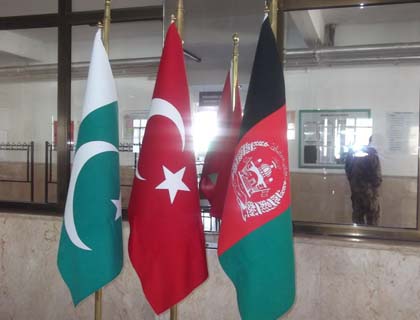Leaders and top representatives from 14 regional countries and 13 western countries involved in Afghanistan are attending the Istanbul Summit today. The US Secretary of State Hilary Clinton cancelled her participation at the last minute due to her mother's illness; who passed away on Monday night. Iran, which has not attended the previous such summits about Afghanistan, has sent their Deputy Foreign Minister Muhammad Fatullahi.
India was excluded from previous Turkish-hosted summits due to Pakistan's opposition, but this time Foreign Minister Krishna is also attending, while representatives from other 'regional countries' include China, Russia, Kazakhstan, Kyrgyzstan, Tajikistan, Turkmenistan, Uzbekistan, Saudi Arabia and UAE.
The Afghan delegation led by President Karzai left Kabul on Monday. Yesterday there was a trilateral meeting among Turkish President Abdullah Gul, President Karzai and President Zardari. General Kayani and Gen Karimi also met. It's the first meeting between Afghan and Pakistani leaders after a new wave of allegations started following the death of former Peace Council Chief Burhanuddin Rabbani. President Karzai raised the issue of his assassination and cross- border rocket attacks with his Pakistani counterpart, which was also discussed by Gen Karimi.
The Afghan delegation which was supposed to visit Pakistan for investigation of Rabbani's assassination has not gone yet due to cold behavior from Islamabad, despite public statements from Pakistani Foreign Office and their Embassy in Kabul to support such an investigation, members of the delegation were denied visa in Kabul.
It might not have been what their Turk hosts wanted the leaders from both sides to discuss, and build confidence. Istanbul is also encouraging Afghanistan and Pakistan to sign new cooperation agreements during the sidelines of this summit, including proposals for joint military exercises. After the trilateral meeting on Monday, the only achievement seemed to be an agreement of 'cooperation' between Afghanistan and Pakistan about the investigation of Rabbani's assassination.
Many hopes are tied to this important summit ahead of the decisive Bonn Conference on December 05. But what objectives the meeting in Istanbul can produce are uncertain. The US and NATO sponsors of the summit want a regional structure for security and economic cooperation to assure non-interference in Afghanistan and support to the transition process, reconciliation and development of Afghan economy, but Pakistan, China and Russia are against such a new forum.
The conference is being called "Security and Cooperation in the Heart of Asia". The outcome intended by the US and NATO sponsors include establishment of a regional cooperation structure. But it's less likely to expect a joint declaration and decision on this agreed by the participants, details of which will come later today after the summit.
To put it in one sentence to summarize the purpose of range of meetings in Kabul and other capitals for a broad support on this proposal, the US wants to ensure greater involvement of regional countries with the end-game, where Pakistan is not going to have a monopolization of political solution and role in the process of reconciliation ahead of 2014 transition.
This process of establishing a mechanism to ensure regional support for Afghanistan is part of President Obama's larger revision of his Afghan strategy, that includes mounting the military pressure on the Haqqani Network, but also offering them the option of talks.
Recently the CIA drone strikes targeted hideouts in Miran Shah, capital of the notorious terrorist hub in North Waziristan, which was avoided previously. Besides this, the US military has increased deployment along the border in Eastern Afghanistan to mount the military pressure against the Haqqanis. These attacks are not based on the regular intelligence sharing between the US and Pakistani intelligence agencies, which is in a deadlock, but due to the arrest of a senior Haqqani Network commander, Mali Khan, who was arrested by NATO forces recently, the death of Jan Baz Zadran in Miran Shah in the drone strike has been possible, which has been a blow to the Haqqani Network
However, under the revised Obama strategy, Pakistan has been offered important role in 'negotiations' after curbing their support to insurgents. But the US military officials say drone strikes will continue aggressively. The hit at Miram Shah has been a message to Pakistan for what that the alternative is.
A meeting of the US National Security Council a couple of weeks ago has also reportedly discussed a possible US raid in Waziristan to attack Haqqani Network elements. It seems the options have been put down for Rawalpindi very clearly that demand; kill the Haqqani Network commanders, help the US to kill them, or persuade them for negotiations.
However, as a report on the New York Times yesterday said, it's easy for Haqqani's, who make frequent travels around Islamabad and Rawalpindi to go to other cities, where CIA drones cannot reach them. And the game will continue.
The Istanbul Summit's agenda of regional cooperation and support for the end-game in Afghanistan will only produce the desired objectives when the primary players, Afghanistan, Pakistan, Taliban and the US make their terms and conditions clearly.
If the Obama Administration persuades Pakistan to play honest, end their support for the Afghan insurgents, pressurize them to come on negotiation table, there won't be the need of a regional structure and headaches such as the agenda of Istanbul Summit. Otherwise, if Rawalpindi, which has already opposed the proposals being discussed today in Istanbul, continues the same game they have been playing for the last ten years, no positive outcomes of such summits should be expected.
Another important factor that seems to be totally out of considerations is essence of the support of Afghan society for the so-called 'political settlement'. No matter what unanimous support and cooperation of regional countries and international players are assured, ignoring the domestic stakeholders of the conflict in Afghanistan is no good. If the US and NATO fails to recognize and understand this, even the unanimous regional support cannot produce a desired 'end-game' in Afghanistan, but another era of crisis and chaos.

